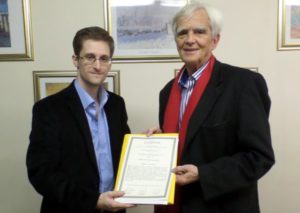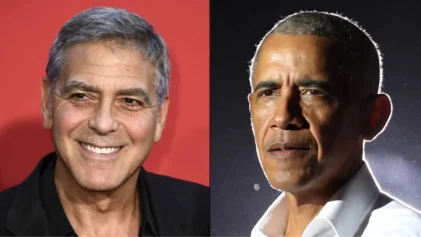While German officials have expressed anger over revelations that the U.S. National Security Agency has been eavesdropping on private cell phone calls of German Chancellor Angela Merkel—in addition to dozens of other world leaders, such as the president of Brazil—Germany has been put in a difficult position by NSA whistleblower Edward Snowden’s willingness to testify in Germany about the details of the Merkel matter.
If Germany allowed Snowden to leave Russia and come to Germany, officials would run the risk of seriously damaging their relationship with the United States, which has expressed an interest in strenuously pursuing and prosecuting Snowden.
“If there were the possibility to hear Snowden as a witness — without bringing him into danger and completely ruining the German-USA relationship — we should use it,” Thomas Oppermann, a Social Democrat who heads the parliamentary intelligence oversight committee, posted on Twitter.
German Interior Minister Hans-Peter Friedrich told Die Zeit newspaper that he was interested in giving Snowden a hearing.
“If Mr. Snowden is willing to talk with German officials, we will find ways to make this conversation possible,” he said. “Any enlightenment, all information and facts that we can get, is good.”
Snowden had a meeting in Russia with Hans-Christian Ströbele, a veteran member of the Green Party in the German Parliament, who brought back a letter from Snowden to Berlin. Ströbele went to Russia and met with Snowden along with two German journalists to learn if Snowden was interested in testifying before German parliament looking into a decade of American snooping on Merkel.
In his letter, Snowden asked the Americans to stop treating him like a traitor.
He said his disclosures about American intelligence activity at home and abroad, which he called “systematic violations of law by my government that created a moral duty to act,” have had positive effects.
Yet “my government continues to treat dissent as defection, and seeks to criminalize political speech with felony charges that provide no defense,” Snowden, 30, wrote in his letter. “However, speaking the truth is not a crime. I am confident that with the support of the international community, the government of the United States will abandon this harmful behavior.”
As the Snowden story developed in Europe, President Obama has ordered the National Security Agency to stop eavesdropping on the headquarters of the International Monetary Fund and World Bank, according to Reuters, which quoted a U.S. official familiar with the matter.
The Obama administration is intent on moving the surveillance story forward to stem the public outrage over the policies of the NSA, many revealed in leaks by Snowden.
It was the first time Washington acknowledged surveillance of the Washington-based IMF and World Bank.
Meanwhile, inside the United Nations, Germany and Brazil have asked the UN General Assembly to adopt a draft resolution calling for the right to privacy in the digital age.
The resolution would call for an end to excessive electronic surveillance, calling the illegal collection of personal data “a highly intrusive act.”
The draft resolution, while not naming individual countries, is a clear reference to recent revelations about the U.S. The resolution, which will be debated by a General Assembly committee focusing on human rights, calls on the 193-member assembly to declare that it is “deeply concerned at human rights violations and abuses that may result from the conduct of any surveillance of communications.”
This includes “extraterritorial surveillance of communications, their interception, as well as the collection of personal data, in particular massive surveillance, interception and data collection.”



